In May I participated in an ad hoc social reading experiment. I hereby dub it The Exploded Twitter Book Club, and think it was both entertaining and instructive. The experience offers a snapshot of social media in 2014, while perhaps suggesting some emerging trends in reading.
It all began in Twitter during the last days of April. The indispensable Audrey Watters tweeted to me about a review of a book I’d recommended before, Vernor Vinge‘s Rainbows End (2006). The reviewer was one James Pulizzi. The three of us quickly fired tweets at each other concerning the novel and some of its themes.
Then things expanded, as they can do in social media. We fed each other’s Amazon habits, touched on other books, notably Piketty’s Capital (previously), and complained about other readers:
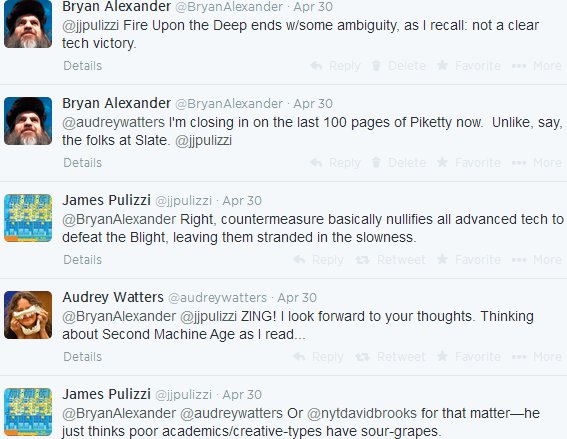
It was for me a pleasant experience, and must have seemed so to others. Because more people joined in, like Tim Scholl, Jesse Willis, and Jenny Colvin. This emergent thing must have struck Tim the right way, because he thought to ask if “Did all of you just (inadvertently) invent the Twitter Book Club?” We liked the idea and started brainstorming readings.
We also discussed media and venues. Between us we were using blogs, Twitter (obviously), Facebook, and Goodreads (my profile). We talked up video as well. Then the splendid SFFAudio enterprise reminded us of podcasting, and my participation in an upcoming book discussion therein.
(That’s why I think of this as the Exploded Twitter Book Club. We raced in other directions from that initial conversation. Well, it could be the Expanded Twitter Book Club, but “Exploded” has a better feel for the energetic moments.)
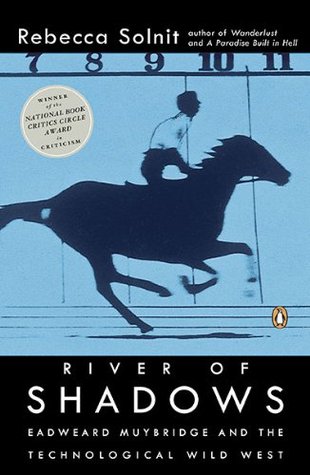 Tim suggested reading Rebecca Solnit‘s River of Shadows (2003), which appealed to us all, probably for its exploration of technology, history, and culture. Personally, I didn’t know enough about the history of early photography and movies, so Muybridge seemed like a good touchstone. I really liked Solnit’s earlier writing on community self-organization in disasters. And Audrey, James, and Tim looked excited by the prospect.
Tim suggested reading Rebecca Solnit‘s River of Shadows (2003), which appealed to us all, probably for its exploration of technology, history, and culture. Personally, I didn’t know enough about the history of early photography and movies, so Muybridge seemed like a good touchstone. I really liked Solnit’s earlier writing on community self-organization in disasters. And Audrey, James, and Tim looked excited by the prospect.
When I probed Amazon for the book, I decided to get a print copy, since River seemed to rely so heavily on illustrations (which makes sense, obviously), and my Kindle e-reader doesn’t render visuals very well. I also decided to skip Amazon, being in an anti-Bezos frame of mind that week, and ordered a copy from the nearest bricks and mortar bookstore.
Once I started reading River I felt that I was reading on a public stage. I wanted to translate my impressions as quickly as possible onto the social media Web: through Twitter, Goodreads, wherever. My solitary experience felt part of a social structure. So Twitter it was, at first:
I started updating my Goodreads River of Shadows page as I went, noting the page number I was on a couple of times, and copying notes into my review page. I still maintained my usual book-reading practices of scrawling notes on print pages, hitting the Web for interesting details (more Muybridge photos, bios of people he encountered, maps), reading parts out loud to my wife and children, and rereading key passages. Not to mention fiddling with the nice flip-book bit in the first chapter.
Ultimately I finished the book, having liked it a great deal, and fleshed my review notes into something more like a review. There Julie Davis appeared with some thoughts. She and I had met through an SFFaudio podcast. She and I have also been on another podcast, albeit in different episodes, the delightful Reading Envy, created and co-curated by… Jennifer Colvin. Who also left a comment on that Goodreads page:
On reflection, a few weeks later…
Was this a book club? Certainly. A group of reading-interested folks came together to talk books. We shared our reflections, pleasures, complaints. We flung book suggestions at each other, and shared details of our lives (including James’ big move; good luck!). We connected with new people.
There’s a fun circulation of words and energy across these different social media platforms. We leaped from Twitter to Goodreads to podcasting (and now to blogging) with – ease? delight? Ultimately that cross-venue jumping just made sense. No one single venue could hold the conversation.
What did it lack? We didn’t pursue video, either through videoconferencing or a recorded reflection. The Twitter conversation petered out. I completely forgot to Storify that discussion, so have had to dig back in the tweet machine to recover it. And it took me too long to blog about this.
Will it continue? I hope so. The Exploded Twitter Book Club was a fine experience. Let’s have another adventure!

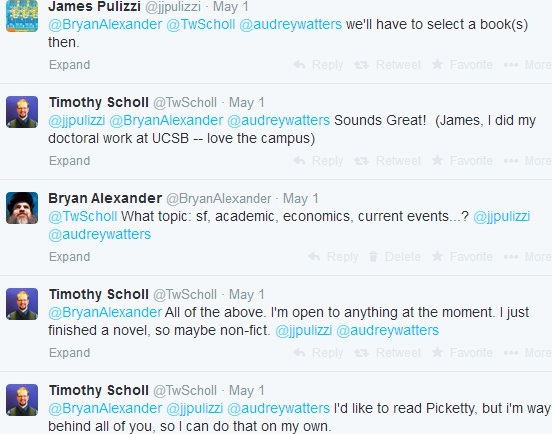
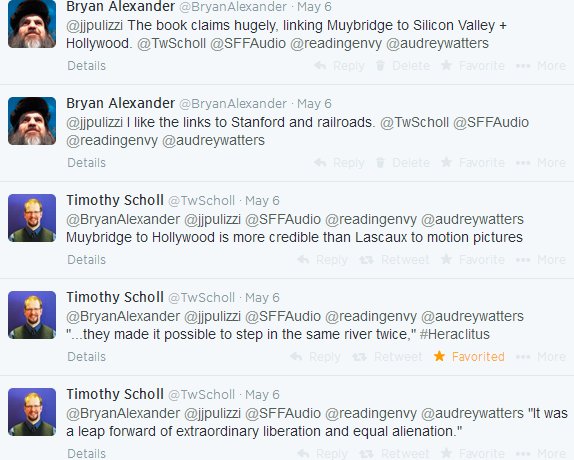
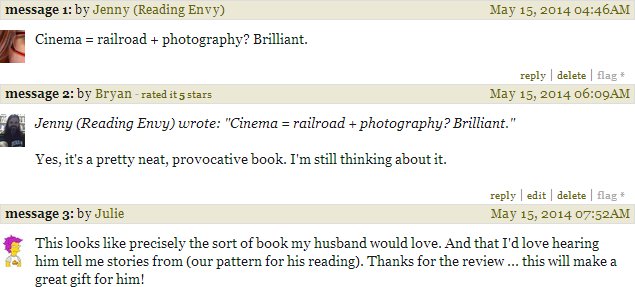




The following came by email from Julie Davis, of http://hcforgottenclassics.blogspot.com/ :
“What a great idea! I like the “exploded” part because it leaves its own wild trail but also allows people to get swept up where they are found on the riverbank (so to speak). I am not into Twitter, but obviously am very much into Goodreads. I’d hate missing part of the conversation, but on the other hand, I am in a monthly bookclub, a regular podcast (Good Story), and sometimes participate at SFFaudio. And so forth and so on.
If you pick a “formal” exploded book let me know. As much as the idea of a “formal” choice can be exploded … which makes me laugh. :-)”
Reblogged this on As the Adjunctiverse Turns and commented:
this falls into place as the final (I hope) piece in an evolving about-Twitter post with an eclectic higher ed bent: advocacy; learning; fun.
Thank you, Vanessa.
Join us!
Pingback: Reading Robert Putnam, _Our Kids_, together online | Bryan Alexander
Pingback: Which near future science fiction book should we read? A blog book club query. | Bryan Alexander
Pingback: The plan for reading _We Make the Road by Walking_ | Bryan Alexander
Pingback: What is our online book club becoming? | Bryan Alexander
Pingback: Which book should we read next? | Bryan Alexander
Pingback: What should we read next? A survey | Bryan Alexander
Pingback: What should our online book club read next? | Bryan Alexander